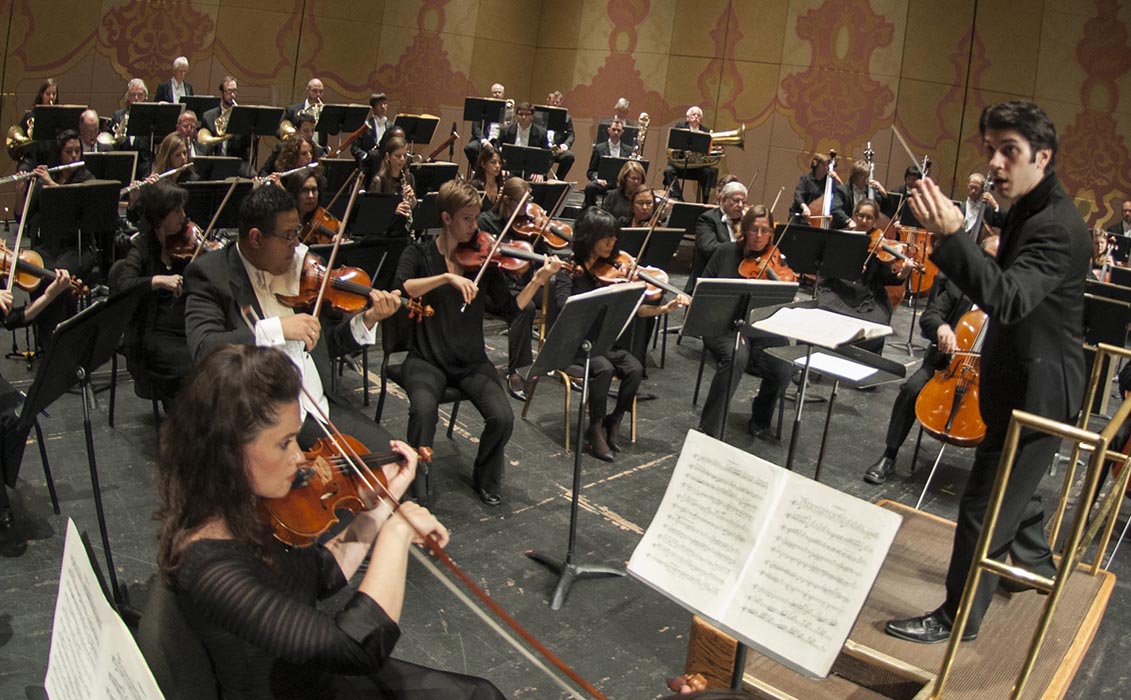Conductor: Aram Demirjian
Kurt Weill: Suite from Die Dreigroschenoper (The Threepenny Opera)
Carl Orff: Carmina Burana
Thursday and Friday, March 15 and 16, 7:30 PM
Tickets and Information
Extreme popularity in classical music can be a double-edged sword—and that is certainly the case with Carl Orff’s 1936 work, Carmina Burana. On a mass appeal level, the work is arguably the most popular 20th Century work in the classical music repertoire, thanks mainly to its status as a sonic extravaganza and its reputation for lewd subject matter, albeit in Latin. The downside, though, is that the commercialization of the opening ‘O Fortuna to sell everything from beer to automobiles in TV commercials has stolen some of its magic.
Still, the work is one for all the human senses, not just the music you hear, but also the music you feel. The work moves fluidly between a single voice and massive choral and instrumental forces, either gently urging listeners forward in their seats or blowing them toward the next county. The text’s subject matter is fairly easy to understand—romance, lust, the pleasures of drinking, and the ineffable elation brought on by springtime. On the off-chance that a listener might have their sensitivity challenged by the humorously bawdy lyrics, one can easily enjoy the spectacle buffered by the old German and Latin texts.
As stated, the performance forces are massive—soprano, tenor, and baritone soloists, a huge chorus, and an orchestra with greatly expanded woodwind and percussion sections. Stylistically, the music runs the gamut from Gregorian chant to addictively complex rhythmic passages with hints of Stravinsky. This variety may partially explain some of the work’s popularity with people of vastly different musical tastes.
In this Knoxville Symphony Orchestra performance, Lindsay Russell is replacing the previously announced Rochelle Bard as the soprano soloist. Both sopranos have appeared recently in Knoxville Opera productions; Russell was previously seen as Gretel in Hänsel und Gretel. Andrew Skoog, a member of the voice faculty of the UT School of Music and a frequent soloist in Carmina Burana performances around the U.S., will be the tenor soloist. Daniel Johnson-Webb, known not only for singing Colline in the Baz Luhrmann production of La Boheme on Broadway, but also as a familiar face and voice to Knoxville audiences, will be the baritone soloist. Taking the majestic and powerful choral role for the KSO will be the Knoxville Choral Society (Eric Thorson, director).
To set the stage for Carmina, KSO music director Aram Demirjian has devised an interesting contrast. He is opening the concert with Gustav Mahler’s Blumine, a work that was originally the second movement, an Andante, in the composer’s Symphony No. 1 from 1896. That movement’s original source comes from some incidental music that Mahler wrote for Joseph Viktor von Scheffel’s tableaux The Trumpeter of Säkkingen. The movement was removed from the symphony following its third performance due to a general negative response from audiences. Blumine was subsequently “lost” until it re-surfaced at an auction in 1959 and its recognition in 1966 by biographer Donald Mitchell. Blumine received its 20th Century premiere from Benjamin Britten a year later at the Aldeburgh Festival.
As another intriguing lead-in to Carmina, Demirjian has programmed the Suite from Die Dreigroschenoper (The Threepenny Opera) by Kurt Weill. This suite dates from a 1956 arrangement by Max Schönherr.








